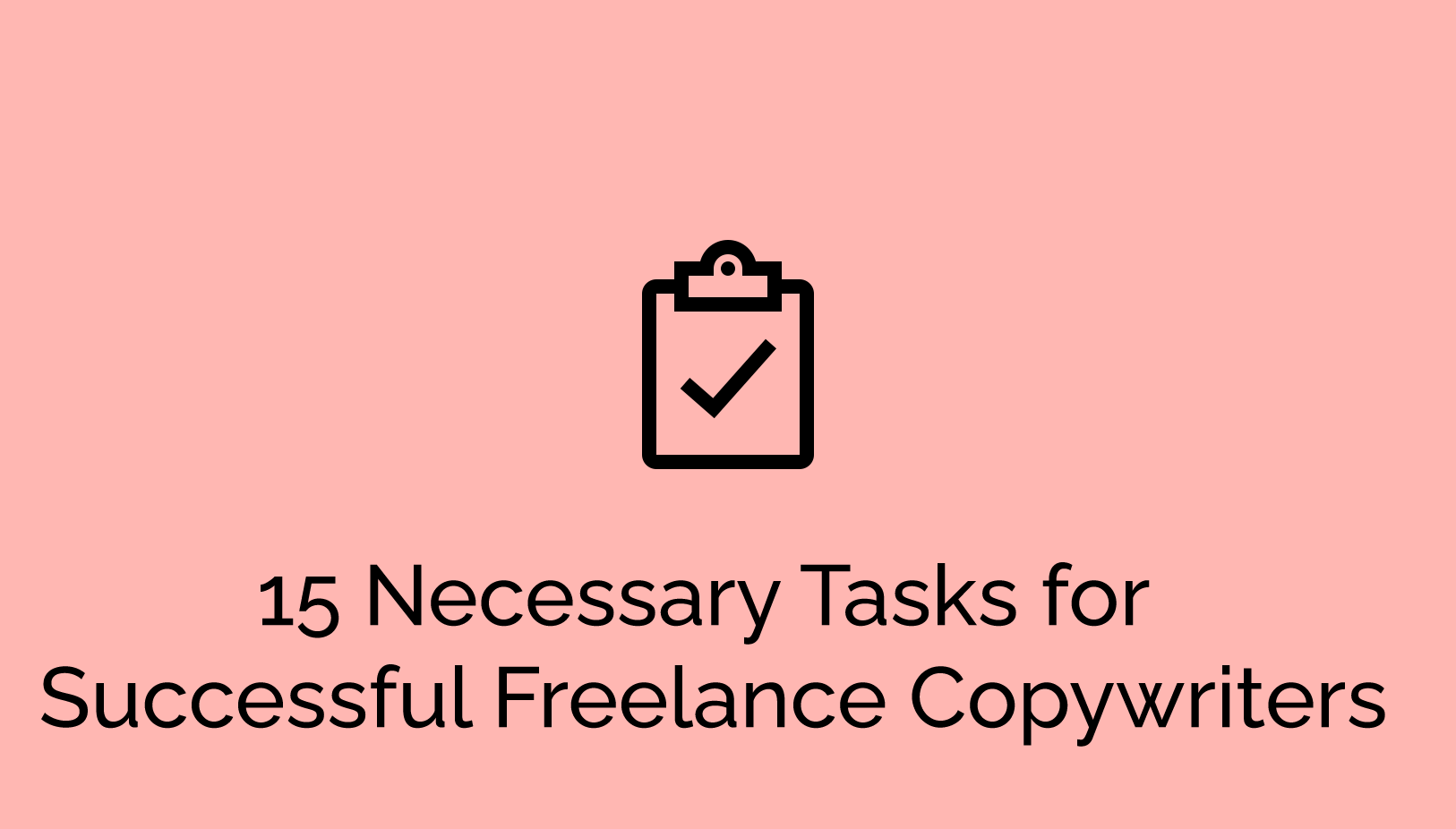There’s a lot more to writing copy in the world of freelance copywriting. Any one of those successful freelance copywriters will tell you that it doesn’t start as a life of luxurious comfort, nor is it plain sailing. With freelancing comes the added stress of running a business and, even when you’re in a position to employ others, this stress doesn’t entirely go away. Here are 15 necessary tasks for successful freelance copywriters:-
01. Advertising
In order to get a freelance business off the ground, a lot of time needs to be spent on advertising your skills. Money is generally in short supply at this early stage so you’ll need to work extremely hard to make up for it. Some clever ways of promoting yourself and your talents are:
- Launch a personal blog or website: Display yourself online as much as you can.
- Word-of-mouth: Spread your name around wherever you are able. Mention what you have started doing and refer people to your online portfolio.
- Send cold emails: Devise a decent email template to advertise yourself via emails and send out as many as you can. Don’t spam – make every one personal and targeted.
- Improve social media presence and activity: Become visible. Show your strengths and your communicative abilities. Be sociable but remain professional.
- Build client relationships: Be present with any existing clients and cater to any needs they may have promptly. Prioritize them.
- Ask for referrals: Ask your best clients for referrals. Do this via email or social media but avoid desperation tactics. Be yourself and explain your request clearly.
02. Website and Blog Maintenance
Your website and blog are your public face and two of your primary advertising platforms. Keep them professional but include some personal bits too. Your audience will want to know who they’re potentially dealing with.
- Market yourself and your skills by building a connection with your users.
- Include an “About” section to promote yourself and your abilities.
- Fill your blog and website with relevant content.
- Maintain an active presence with regular updates.
03. Using Freelancing Platforms
The more exposure that you can get early in your freelancing career, the more opportunities you create for yourself. Sites like Upwork, Fiverr and Freelancer are all well-known platforms for sourcing projects.
04. Quoting
Many freelancers find quoting very difficult. Establish your self-worth and assess where you’d like to end up. Then plan how you’ll get there but don’t be impatient. More haste, less speed.
- Don’t undervalue yourself. You may get more work initially but this action is likely to follow you.
- Research what similar freelance copywriters are charging and come in at an equivalent rate.
- Budget and decide on your available hours, and assess accordingly.
- Don’t be pie in the sky: with hard work you’ll get to your desired monthly income in time.
- Create or download a quotation template and personalise it.
- A quotation is another important way of advertising yourself. Make it unique and promote your knowledge with it. Don’t be vague – be specific to your potential client’s needs and detail how you will solve their problem.
05. Submitting Proposals
When you submit a proposal, carefully consider the potential client before formulating it.
- Personalise your response. Ensure that you address your potential client directly.
- Be empathetic. Show how you understand the client’s needs by relating to the problem and offer your solution in an authentic manner.
- Capture the attention of the client fast. Keep to the point and don’t gloss things up too much.
- Sell your skills. Ensure that the client understands why you’re the perfect person for the job.
- Be professional whilst maintaining a friendly writing style.
- Refer to your portfolio. Include links to your previous work and to your website and blog.
- Ensure that your capitalization, grammar and spelling are outstanding. Remember that you’re selling yourself!
- Ask questions if you’re unclear about anything. The client would rather hire somebody that communicates and ensures the end copy is exactly what is required.
- Be clear about the deadline that you can commit to so that there are no surprises later.
06. Encouraging Reviews from Clients
Reviews increase exposure. Exposure, as a new freelance copywriter, is vitally important..
- Ask for reviews. Clients who are impressed with your submissions will generally have no problem writing them. Neither will upset clients though, so make sure your work is on point.
- Personalise your review requests.
- In your requests, explain the importance of reviews to you.
- Create a “Reviews” page on your website.
- Request reviews as part of your billing documents – make a note at the bottom of invoices and receipts.
- Use your own social media pages and groups to request reviews.
07. Project Scheduling
The busier you get, the more necessary it will be to schedule your projects. This gives you an idea of how long a project should take and the necessary work you’ll need to do in order to complete it, possibly while you’re also busy with other projects.
- Calculate the time you have available to you.
- Schedule the actions you need to take for the project, highlighting those that are absolutely essential to doing a great job.
- Make certain you build in additional time in case of unforeseen circumstances.
08. Admin, Accounts & Billing
When you start freelancing you will need to allocate time to do “the dirty work”.
- Any administrative tasks, and your invoicing and receipts.
- Balance your petty cash.
- Generate monthly statements for outstanding amounts.
- Carry out bank statement reconciliations.
- Keep relevant documentation for taxation purposes.
09. Visiting and/or Checking in with Clients
Maintain a good rapport with your clients by visiting them personally when possible. At the very least, attempt a phone call with your clients regularly, without being overly pesky. Besides the obvious benefit of building your client relationships, there are some other very good reasons to call on your clients:-
- The assistance with improving your understanding of your clientele and how their business is carried out.
- Being introduced to many of those who make actual use of your services, not only your usual contact.
- The ability to gain a better understanding of your clients’ needs in context.
- Allows opportunity by both parties to address any concerns that could interfere with further business.
- Enables a better assessment of the scope for future business opportunities.
10. Conducting Industry Research
Research into your clients and the industries they represent is another important facet of a freelancers’ path to success, as is necessary research into your assigned project.
- Read and study previous reports by your client, related industry leaders, connected businesses and your client’s competition. These will help you to assess where your client stands business-wise, what improvements to potential copy target areas may be made and the general tone and focus of your copy itself.
- Research industry trends, norms, standards, ratios and potential competition.
- Understand your client’s SWOT and, hence, where they fit in their industry.
11. Research Your Clients’ Customers
Understanding your clients’ users is imperative to producing the best and most well-informed copy that you can for them. On most occasions, you can request the analytical data and personas of your clients’ audiences which will save you time and your client money. On occasion though, you may be required to carry out this research yourself. Either way, user research is invaluable to your copywriting project. Remember to allow for this in your quotation if necessary.
12. Writing Copy
This is what you were previously employed to do, isn’t it? It is clearly a copywriter’s primary role but, in the world of freelance copywriting, it only plays one role in many. Nevertheless, generating your copy in the most well-informed and visually-appealing manner is of the utmost importance. There’s no need to delve into this role any further – you know how to do this!
13. Utilising Available Resources
Perhaps you didn’t experience any problems with time management when you were EMPLOYED as a copywriter. As you progress into successful freelancing, your time management prowess will be tested. Progression means more work and less time and, as such, you may find yourself under more pressure to meet deadlines than ever before. With this pressure will come times where you feel burnt out, or at least, devoid of inspiration and creativity.
- Don’t panic. You’ll make it work.
- Investigate online resources. There are many free or inexpensive analytical tools and templates that can improve your productivity and save you time.
- Consider the assistance of an AI content generator. The features included in ContentBot, for example, are designed to assist you in generating your copy outline in a way that makes it easier for you to come up with content ideas and formats that will ease stress levels and periods of writer’s block. It is generally easier to edit than it is to write from scratch, and these features ensure you’ll be able to maintain your original content without undue stress.
14. Presenting Drafts & Making Amendments
Sometimes it is best to offer a draft presentation of a project to your client in your quote or proposal, with a prior deadline. This allows your client the opportunity to review your work and suggest any changes in a more relaxed manner. Time your draft deadline and final submission deadline so that you’re able to make any adjustments without pressure.
15. Submitting Final Copy Before Deadline
On receiving any suggested client changes, you will need to get stuck in and amend where necessary in order to submit your final copy before its deadline. If you have worked to a pre-arranged draft deadline and met the same, it is likely that you stipulated at least a few days from receipt of any changes until your final copy’s submission date. This should depend on the number of changes you anticipate and your workload from other clients but, if you have confidence in your ability, this time period should suffice. From here on, meeting your final deadline should be a breeze.
Summary
It may take some time adjusting to not working for a boss, and you may find you have a whole new respect for your previous employer too! You’ve chosen to freelance and are giving yourself the opportunity to scale the heights already reached by many of your six-figure predecessors. Be patient though. Your natural talent, work ethic and motivation will get you there but be prepared to do the hard grind required with all 15 necessary tasks for successful freelance copywriters.
It will be worth it in the long run. Good luck!
- Technology and the future of books - July 29, 2021
- The benefits and importance of UX writing - July 29, 2021
- Use the science of music as a tool to enhance creative productivity - July 28, 2021


2 thoughts on “15 Necessary Tasks for Successful Freelance Copywriters: It’s Not All About the Copy”